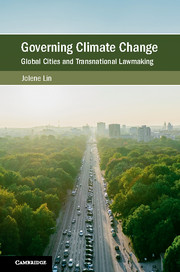Book contents
- Governing Climate Change
- Cambridge Studies on Environment, Energy and Natural Resources Governance
- Governing Climate Change
- Copyright page
- Contents
- Acknowledgements
- Abbreviations
- 1 Global Cities, Climate Change, and Transnational Lawmaking
- 2 Theoretical Framework
- 3 The Rise of the City in International Affairs
- 4 City Action on Climate Change
- 5 Transnational Urban Climate Governance via Networks: The Case of C40
- 6 Cities as Transnational Lawmakers
- 7 A Normative Assessment of Urban Climate Law
- 8 Conclusion
- Select Bibliography
- Index
3 - The Rise of the City in International Affairs
Published online by Cambridge University Press: 04 June 2018
- Governing Climate Change
- Cambridge Studies on Environment, Energy and Natural Resources Governance
- Governing Climate Change
- Copyright page
- Contents
- Acknowledgements
- Abbreviations
- 1 Global Cities, Climate Change, and Transnational Lawmaking
- 2 Theoretical Framework
- 3 The Rise of the City in International Affairs
- 4 City Action on Climate Change
- 5 Transnational Urban Climate Governance via Networks: The Case of C40
- 6 Cities as Transnational Lawmakers
- 7 A Normative Assessment of Urban Climate Law
- 8 Conclusion
- Select Bibliography
- Index
Summary
In short, global cities are increasingly driving world affairs – economically, politically, socially and culturally.
They are no longer just places to live in.
They have emerged as leading actors on the global stage.
Given that by 2050, eight out of ten people in the world will be living in cities, ‘the battle for a more sustainable future will be won or lost in cities.’
INTRODUCTION
Cities have existed since prehistoric times. Over the past 2,000 years, a few cities have emerged as international political centres. These were mostly imperial cities – such as Thebes, Babylon, Persepolis, Rome, and Constantinople – which were ‘capitals of great empires and their conquered territories’. In China, the Spring and Autumn period (771–481 BC) was the age of the city state; the area surrounding the Yellow River was divided into hundreds of states, most of which consisted of a single city and its hinterland. In more recent history, cities including Vienna, St Petersburg, Amsterdam, and London also asserted significant social and political influence on the international stage. These cities wielded a significant amount of power and influence because of the strength and wealth of the empires over which they ruled.
Urbanization in the twentieth-first century differs from the past in its rate and scale. In 1800, when the global population was around a billion people, Beijing was the only city in the world with more than a million inhabitants. In 2014, Tokyo was the world's largest city, with 38 million inhabitants. The UN projects that by 2030, the world will have forty-one megacities with a population of at least 10 million inhabitants each. In 1950, one-third of the world's population lived in cities. This figure is expected to rise to two-thirds by 2050. It should also be noted that there is invariably a close connection between rural areas and urban metropolises. Rood and his colleagues, for example, have demonstrated that a land area about four times larger than the Netherlands is used to meet the food and fibre needs of this highly urbanized country. It is therefore not an exaggeration to say that we are living in an ‘urban age’.
- Type
- Chapter
- Information
- Governing Climate ChangeGlobal Cities and Transnational Lawmaking, pp. 42 - 69Publisher: Cambridge University PressPrint publication year: 2018



